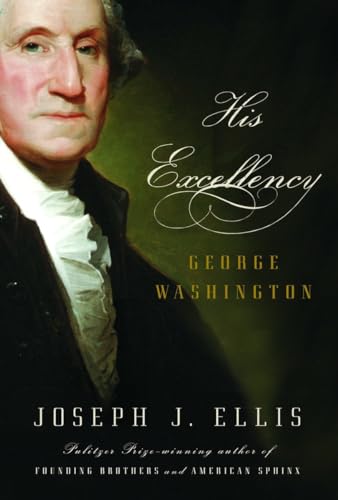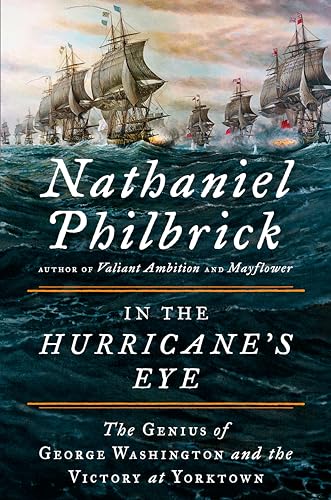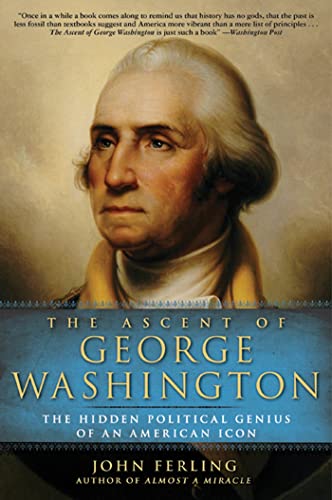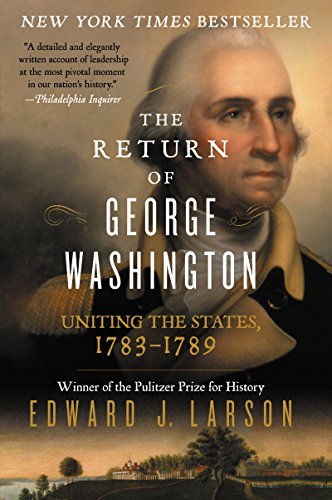The George Washington Masterclass: 9 Essential Titles For Your Bookshelf
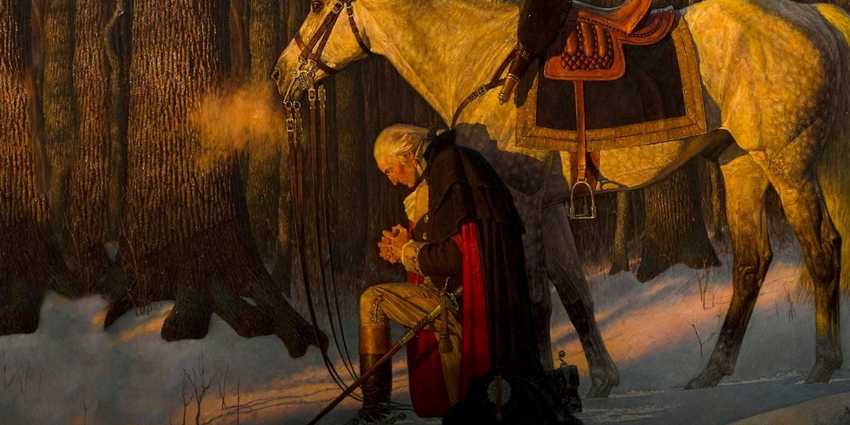
Step into the world of George Washington like never before. This meticulously curated collection brings the Founding Father's legacy to life, offering a diverse range of insightful reads that go beyond the history books. Uncover the secrets of Washington's leadership, explore untold stories, and gain a profound understanding of the man behind the myth. Elevate your knowledge and immerse yourself in the essence of George Washington with these indispensable reads that every history enthusiast and curious reader alike can't afford to miss!
"Washington: A Life"
by Ron Chernow (2010)
![Book Cover of Washington: A Life] (https://pictures.abebooks.com/isbn/9780143119968-us.jpg)
In Washington: A Life celebrated biographer Ron Chernow provides a richly nuanced portrait of the father of our nation. With a breadth and depth matched by no other one-volume life of Washington, this crisply paced narrative carries the reader through his troubled boyhood, his precocious feats in the French and Indian War, his creation of Mount Vernon, his heroic exploits with the Continental Army, his presiding over the Constitutional Convention, and his magnificent performance as America's first president.
"His Excellency: George Washington"
by Joseph J. Ellis (2004)
To this landmark biography of our first president, Joseph J. Ellis brings the exacting scholarship, shrewd analysis, and lyric prose that have made him one of the premier historians of the Revolutionary era. Training his lens on a figure who sometimes seems as remote as his effigy on Mount Rushmore, Ellis assesses George Washington as a military and political leader and a man whose “statue-like solidity” concealed volcanic energies and emotions. Here is the impetuous young officer whose miraculous survival in combat half-convinced him that he could not be killed. Here is the free-spending landowner whose debts to English merchants instilled him with a prickly resentment of imperial power. We see the general who lost more battles than he won and the reluctant president who tried to float above the partisan feuding of his cabinet. His Excellency is a magnificent work, indispensable to an understanding not only of its subject but also of the nation he brought into being.
"1776"
by David McCullough (2005)
America’s beloved and distinguished historian presents, in a book of breathtaking excitement, drama, and narrative force, the stirring story of the year of our nation’s birth, 1776, interweaving, on both sides of the Atlantic, the actions and decisions that led Great Britain to undertake a war against her rebellious colonial subjects and that placed America’s survival in the hands of George Washington.
"Washington's Crossing"
by David Hackett Fischer (2004)
Six months after the Declaration of Independence, the American Revolution was all but lost. A powerful British force had routed the Americans at New York, occupied three colonies, and advanced within sight of Philadelphia. Yet, as David Hackett Fischer recounts in this riveting history, George Washington--and many other Americans--refused to let the Revolution die. On Christmas night, as a howling nor'easter struck the Delaware Valley, he led his men across the river and attacked the exhausted Hessian garrison at Trenton, killing or capturing nearly a thousand men. A second battle of Trenton followed within days. The Americans held off a counterattack by Lord Cornwallis's best troops, then were almost trapped by the British force. Under cover of night, Washington's men stole behind the enemy and struck them again, defeating a brigade at Princeton. The British were badly shaken. In twelve weeks of winter fighting, their army suffered severe damage, their hold on New Jersey was broken, and their strategy was ruined.
"In the Hurricane's Eye: The Genius of George Washington and the Victory at Yorktown"
by Nathaniel Philbrick (2018)
In the concluding volume of his acclaimed American Revolution series, Nathaniel Philbrick tells the thrilling story of the year that won the Revolutionary War.In the fall of 1780, after five frustrating years of war, George Washington had come to realize that the only way to defeat the British Empire was with the help of the French navy. But coordinating his army's movements with those of a fleet of warships based thousands of miles away was next to impossible. And then, on September 5, 1781, the impossible happened. Recognized today as one of the most important naval engagements in the history of the world, the Battle of the Chesapeake—fought without a single American ship—made the subsequent victory of the Americans at Yorktown a virtual inevitability. A riveting and wide-ranging story, full of dramatic, unexpected turns, In the Hurricane's Eye reveals that the fate of the American Revolution depended, in the end, on Washington and the sea.
"The Ascent of George Washington: The Hidden Political Genius of an American Icon"
by John Ferling (2009)
Perhaps the most revered American of all, George Washington has long been considered a stoic leader who held himself above the fray of political infighting. What has gone unnoticed about the much-researched life of Washington is that he was in fact a consummate politician, as historian John Ferling shows in this revealing and provocative new book. As leader of the Continental Army, Washington's keen political savvy enabled him not only to outwit superior British forces, but--even more challenging--to manage the fractious and intrusive Continental Congress. Despite dire setbacks early in the war, Washington deftly outmaneuvered rival generals and defused dissent from officers below him, ending the war with the status of a national icon. His carefully burnished reputation allowed Washington, as president, to lead the country under the guise of non-partisanship for almost all of his eight years in office. Washington, Ferling argues, was not only one of America's most adroit politicians, he was easily the most successful of all time--so successful, in fact, that he is no longer thought of as having been political.
"Revolutionary: George Washington at War"
by Robert L. O'Connell (2007)
From an acclaimed military historian, a bold reappraisal of young George Washington, an ambitious if reckless soldier destined to become the legendary general who took on the British and, through his leadership, defined the American character. How did George Washington become an American icon? Robert L. O’Connell introduces us to Washington before he was Washington: a young soldier champing at the bit for a commission in the British army, frustrated by his position as a minor Virginia aristocrat. Fueled by ego, Washington led a disastrous expedition in the Seven Years’ War, but then the commander grew up. We witness George Washington take up politics and join Virginia’s colonial governing body, the House of Burgesses, where he became ever more attuned to the injustices of life under the British Empire and the paranoid, revolutionary atmosphere of the colonies. When war seemed inevitable, he was the right man—the only man—to lead the nascent American army.
"The Return of George Washington: 1783-1789"
by Edward J. Larson (2015)
After leading the Continental Army to victory in the Revolutionary War, George Washington shocked the world: he retired. In December 1783, General Washington, the most powerful man in the country, stepped down as Commander in Chief and returned to private life at Mount Vernon. Yet as Washington contentedly grew his estate, the fledgling American experiment floundered. Under the Articles of Confederation, the weak central government was unable to raise revenue to pay its debts or reach a consensus on national policy. The states bickered and grew apart. When a Constitutional Convention was established to address these problems, its chances of success were slim. Jefferson, Madison, and the other Founding Fathers realized that only one man could unite the fractious states: George Washington. Reluctant, but duty-bound, Washington rode to Philadelphia in the summer of 1787 to preside over the Convention.
"George Washington Dealmaker-In-Chief: The Story of How The Father of Our Country Unleashed The Entrepreneurial Spirit in America"
by Cyrus A. Ansary (2019)
Drawing on substantial new material, Cyrus A. Ansary gives a riveting account of how George Washington sought to put in place in America an economic system that was the antithesis of what had existed in the colonies under British rule. The entrepreneurial economy – which nurtures and rewards innovation and inventiveness – did not sprout into being in the United States by sheer happenstance. It was put in place by our first President. He painstakingly laid the foundation for it, but it did not take root without a struggle. He needed extraordinary tenacity to overcome fierce opposition to his program.President Washington’s economic initiatives are the least well understood facets of Washington’s busy and productive life. They enlarged the dreams and opportunities of Americans, led to a flourishing entrepreneurial climate, and are an inspiring tale for our time.
